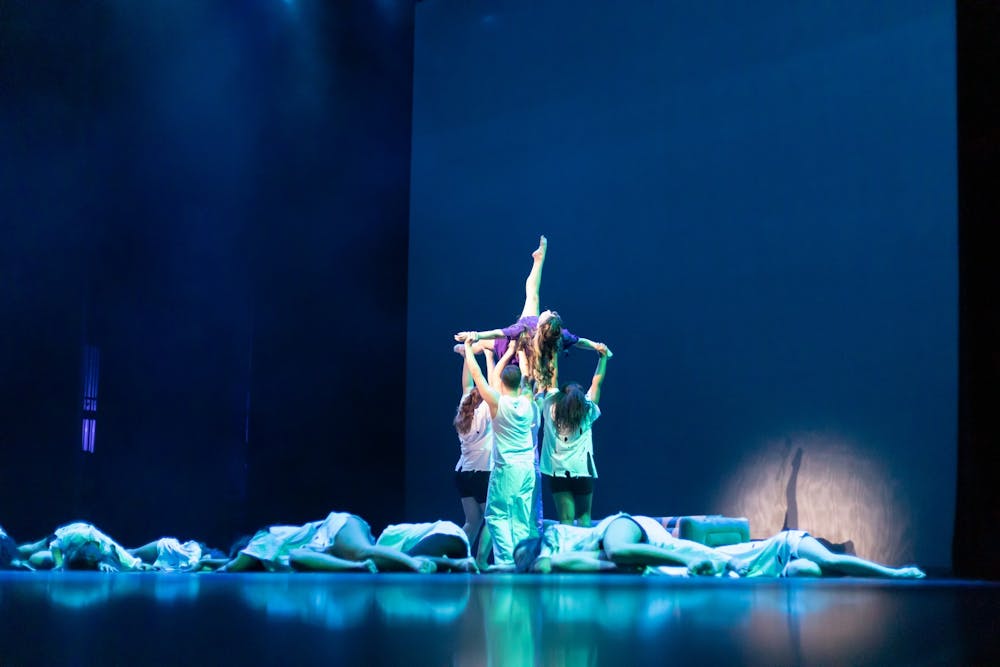At the end of its International Fiesta performance Saturday, the Latin American Student Association stormed the Center for the Arts stage, holding signs to protest domestic violence.
The display was the final emotional moment in the club’s first-place victory at SA’s annual dance competition. It marked LASA’s fourth win since 2011, with a performance that illuminated domestic violence within the Latin American community.
And the routine emphasized this year’s theme of resilience as 11 clubs performed in front of roughly 1,500 audience members at the sold-out show. Judges scored clubs on creativity, choreography and story line, according to Omran AlBarazanchi, SA International Council Coordinator. LASA’s first-place dance portrayed the story of a domestic violence survivor who searches for the strength to leave her abuser. Indian SA and Pakistani SA finished in second place with a collaborative performance that also portrayed a theme of domestic violence, as last year’s first-place club, Korean SA, came in third with a performance encouraging the audience to break from societal norms.

Korean Student Association took home the third prize. Their act depicted the overwhelming pressure faced by Koreans to succeed in school, work and make money.
Anthony Vargas, LASA president, said domestic violence is “prevalent” within the Latinx community but isn’t widely talked about.
“It’s such an important issue, it’s very critical to us in making sure that we got our message out to the public and showing that as Latin Americans we are resilient to whatever we face –– domestic violence or whatever else,” Vargas said.
LASA’s dance told the story of an abusive relationship, starting with bachata, a Dominican style of dance, depicting how she and her abusive boyfriend met. The performance went on to show her battling with her emotions –– whether she should stay or leave –– before standing up to her abuser.
Omer Rana, Pakistani SA president, said the club was “excited” to embody resilience through dance because it allowed performers to convey experiences they have “on a daily basis.” Rana said Southeast Asian cultures often have a “mindset” that women should be submissive to their partners. Through the performance of acrobatic flips and tight choreography, the clubs wanted to combat these stereotypes and demonstrate Southeast Asian women’s resilience.

The Indian and Pakistani SA performed together on Saturday and took second place at the event.
“We want to showcase [that] that’s not true, and that women have the power to stand up and fight for equality and fight for getting through what they’re going through,” Rana said. “We know they can get through it, they have the resilience to get through it.”
Inha Jung, dance captain for KSA’s dance team Casanova, said she wanted the club’s dance to reflect problems that those in Korean society face. The dance told the story of a girl taught how to live her life at a young age and who later breaks free of social norms.
“Life is actually yours, not our parents so that was our focus and then how a lot of people in Korea are saying, ‘we have a good country, but like it's good if we have lots of money,’” Jung said. “So we showed lower-status people reaching for money and how the younger ones showed the money is not happiness.”
Nanzeeba Ahmad, a junior biomedical sciences major, said each group did “amazing” and being a part of the audience was “exhilarating.”
“Even though ISA, PSA and LASA had the same theme, they portrayed it in a completely different manner,” Ahmad said. “I just think it was a great idea to choose resilience as the theme, because it’s important as college students for us to learn [resilience] and I’m glad that we got to see it in a variety of light.”
Vargas said building “bonds” during practices was more important than going home victorious.
“Our job was done when we had fun out there and we left it all on the stage and we made that family bond and that’s what matters,” Vargas said. “You know, it’s not about the placement, it’s just about how much love and family bonding we create with each other here in LASA and any club.”
Looking back, AlBarazanchi is glad he chose resilience as the theme because it is “relevant” to many students’ lives.
“There are a lot of times where we get knocked down in life; that’s not the problem. The problem is our will to get back on our feet,” AlBarazanchi said. “That’s what resilience is and a lot of countries have special stories for that and I hope that they got to display this here through their performance.”
Alexandra Moyen is a senior news editor and can be reached at alexandra.moyen@ubspectrum.com and on Twitter @AlexandraMoyen

Alexandra Moyen is the senior features editor of The Spectrum.





